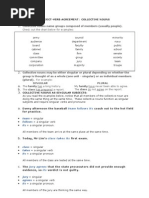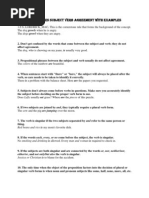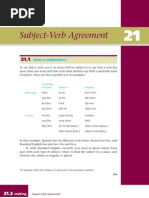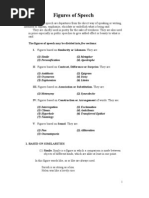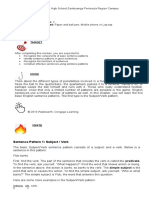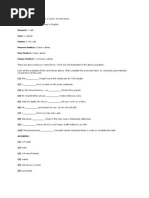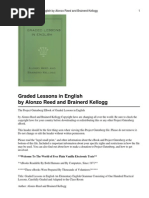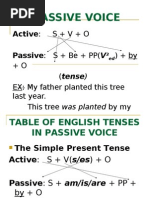20 Rules of Subject Verb Agreement
20 Rules of Subject Verb Agreement
Uploaded by
John Walter TorreCopyright:
Available Formats
20 Rules of Subject Verb Agreement
20 Rules of Subject Verb Agreement
Uploaded by
John Walter TorreOriginal Description:
Copyright
Available Formats
Share this document
Did you find this document useful?
Is this content inappropriate?
Copyright:
Available Formats
20 Rules of Subject Verb Agreement
20 Rules of Subject Verb Agreement
Uploaded by
John Walter TorreCopyright:
Available Formats
20 Rules of Subject Verb Agreement
1. Subjects and verbs must agree in number. This is the cornerstone rule that forms the background of the concept. The dog growls when he is angry. The dogs growl when they are angry. 2. Dont get confused by the words that come between the subject and verb; they do not affect agreement. The dog, who is chewing on my jeans, is usually very good. 3. Prepositional phrases between the subject and verb usually do not affect agreement. The colors of the rainbow are beautiful. 4. When sentences start with there or here, the subject will always be placed after the verb, so care needs to be taken to identify it correctly. There is a problem with the balance sheet. Here are the papers you requested. 5. Subjects don't always come before verbs in questions. Make sure you accurately identify the subject before deciding on the proper verb form to use. Does Lefty usually eat grass? Where are the pieces of this puzzle. 6. If two subjects are joined by and, they typically require a plural verb form. The cow and the pig are jumping over the moon. 7. The verb is singular if the two subjects separated by and refer to the same person or thing. Red beans and rice is my mom's favorite dish. 8. If one of the words each, every, or no comes before the subject, the verb is singular. No smoking or drinking is allowed. Every man and woman is required to check in. 9. If the subjects are both singular and are connected by the words or, nor, neither/nor, either/or, and not only/but also the verb is singular. Jessica or Christian is to blame for the accident. 10. The only time when the object of the preposition factors into the decision of plural or singular verb forms is when noun and pronoun subjects like some, half, none, more, all, etc. are followed by a prepositional phrase. In these sentences, the object of the preposition determines the form of the verb. All of the chicken is gone. All of the chickens are gone. 11. The singular verb form is usually used for units of measurement or time. Four quarts of oil was required to get the car running. 12. If the subjects are both plural and are connected by the words or, nor, neither/nor, either/or, and not only/but also, the verb is plural. Dogs and cats are both available at the pound.
13. If one subject is singular and one plural and the words are connected by the words or, nor, neither/nor, either/or, and not only/but also, you use the verb form of the subject that is nearest the verb. Either the bears or the lion has escaped from the zoo. Neither the lion nor the bears have escaped from the zoo. 14. Indefinite pronouns typically take singular verbs. * Everybody wants to be loved. 15. * Except for the pronouns (few, many, several, both, all, some) that always take the plural form. Few were left alive after the flood. 16. If two infinitives are separated by and they take the plural form of the verb. To walk and to chew gum require great skill. 17. When gerunds are used as the subject of a sentence, they take the singular verb form of the verb; but, when they are linked by and, they take the plural form. Standing in the water was a bad idea. Swimming in the ocean and playing drums are my hobbies. 18. Collective nouns like herd, senate, class, crowd, etc. usually take a singular verb form. The herd is stampeding. 19. Titles of books, movies, novels, etc. are treated as singular and take a singular verb. The Burbs is a movie starring Tom Hanks. 20. Final Rule Remember, only the subject affects the verb! Subjects and verbs must AGREE with one another in number (singular or plural). Thus, if a subject is singular, its verb must also be singular; if a subject is plural, its verb must also be plural.
In present tenses, nouns and verbs form plurals in opposite ways: nouns ADD an s to the singular form, BUT verbs REMOVE an s from the singular form.
Here are nine subject-verb agreement rules. 1. A phrase or clause between subject and verb does not change the number of the subject. Example 2. Indefinite pronouns as subjects Singular indefinite pronoun subjects take singular verbs. Plural indefinite pronoun subjects take plural verbs. PLURAL: several, few, both, many Some indefinite pronouns may be either singular or plural: with uncountable, use singular; with countable, use plural. EITHER SINGULAR OR PLURAL: some, any, none, all, most
Sugar is uncountable; therefore, the sentence has a singular verb. Marbles are countable; therefore, the sentence has a plural verb. 3. Compound subjects joined by and are always plural. 4. With compound subjects joined by or/nor, the verb agrees with the subject nearer to it. In the above example, the plural verb are agrees with the nearer subject actors. In this example, the singular verb is agrees with the nearer subject director. 5. Inverted Subjects must agree with the verb. 6. Collective Nouns (group, jury, crowd, team, etc.) may be singular or plural, depending on meaning. In this example, the jury is acting as one unit; therefore, the verb is singular. In this example, the jury members are acting as twelve individuals; therefore, the verb is plural. 7. Titles of single entities (books, organizations, countries, etc.) are always singular. 8. Plural form subjects Plural form subjects with a singular meaning take a singular verb. (e.g. news, measles, mumps, physics, etc.) Plural form subjects with singular or plural meaning take a singular or plural verb, depending on meaning. (e.g. politics, economics, etc.) In this example, politics is a single topic; therefore, the sentence has a singular verb. In this example, politics refers to the many aspects of the situation; therefore, the sentence has a plural verb. Plural form subjects with a plural meaning take a plural verb. (e.g. scissors, trousers) Note: In this example, the subject of the sentence is pair; therefore, the verb must agree with it. (Because scissors is the object of the preposition, scissors does not affect the number of the verb.) 9. With subject and subjective complement of different number, the verb always agrees with the subject. 10-A. With one of those ________ who, use a plural verb. The above example implies that others besides Hannah like to read comic books. Therefore, the plural verb is the correct form to use. 10-B. With the only one of those ________who, use a singular verb.
The above example implies that no one else except for Hannah likes to read comic books. Therefore, the singular verb is the correct for to use. 11-A. With the number of _______, use a singular verb. 11-B. With a number of _______, use a plural verb. 12. With every ______ and many a ________, use a singular verb.
You might also like
- Eight Parts of SpeechDocument42 pagesEight Parts of SpeechAlexanderBarrera100% (1)
- Module 6 Types of PhrasesDocument3 pagesModule 6 Types of PhrasesAsterio Ornopia Asa100% (1)
- Parts of Speech ModuleDocument153 pagesParts of Speech Moduleramalmonte100% (2)
- Subject-Verb Agreement Collective NounsDocument4 pagesSubject-Verb Agreement Collective Nounssafma94% (31)
- Formulario Básico de InglésDocument12 pagesFormulario Básico de InglésPaola Chambe0% (1)
- SUBJECT VERB AGREEMENT RulesDocument6 pagesSUBJECT VERB AGREEMENT RulesFuad Hasan100% (1)
- Subject Verb Agreement QuizDocument5 pagesSubject Verb Agreement QuizAnonymous o80kcolx5l100% (1)
- Subject Verb AgreementDocument6 pagesSubject Verb AgreementMhin Mhin67% (6)
- English Sentence StructureDocument3 pagesEnglish Sentence Structurebushrapaki2180% (20)
- Pronoun Antecedent RulesDocument3 pagesPronoun Antecedent RulesDeyan MaghanoyNo ratings yet
- Chedaka AgroDocument1 pageChedaka AgroJohn Walter Torre100% (1)
- Ukrainian LessonsDocument31 pagesUkrainian LessonsAndrew Baran100% (2)
- Subject Verb AgreementDocument22 pagesSubject Verb AgreementAljenneth MicallerNo ratings yet
- 20 Rules Subject Verb Agreement With ExamplesDocument6 pages20 Rules Subject Verb Agreement With Examplesaaaaaaaaaaaaaaahfre78% (9)
- Rules of Subject Verb AgreementDocument5 pagesRules of Subject Verb AgreementNaldo NaldoNo ratings yet
- Functions of NounsDocument3 pagesFunctions of NounsRalph Tama Mangacop BenitoNo ratings yet
- Sentence StructureDocument10 pagesSentence StructureBobby Naagar100% (1)
- Subject Verb AgreementDocument12 pagesSubject Verb Agreementjizanliving100% (1)
- Subject Verb AgreementDocument2 pagesSubject Verb Agreementapi-260484505No ratings yet
- Subject Verb AgreementDocument96 pagesSubject Verb AgreementGenevieve Patricio Lu0% (1)
- Subject Verb AgreeementDocument30 pagesSubject Verb AgreeementAlexandra Benitez Gan100% (1)
- 23 Rules of Subject-Verb AgreementDocument12 pages23 Rules of Subject-Verb AgreementJef T DBautista50% (4)
- Subject-Verb Agreement ModuleDocument16 pagesSubject-Verb Agreement Modulekhairulrasyid100% (2)
- Figures of SpeechDocument2 pagesFigures of Speechmar cris velascoNo ratings yet
- Lesson Plan Grade 9 EnglishDocument5 pagesLesson Plan Grade 9 EnglishKristine WaliNo ratings yet
- Transitive and Intransitive VerbsDocument3 pagesTransitive and Intransitive VerbsMark Evan Evangelista100% (1)
- Persuasive Essay PromptsDocument3 pagesPersuasive Essay PromptsleewardshoreNo ratings yet
- Subject Verb AgreementDocument38 pagesSubject Verb AgreementPrince Zio100% (2)
- Book 01 Chapter 21 Subject Verb AgreementDocument12 pagesBook 01 Chapter 21 Subject Verb Agreementfzaaba89% (9)
- Quiz On Types of AdverbDocument5 pagesQuiz On Types of AdverbCherlyn Arias Ibañez0% (3)
- Subject Verb AgreementDocument17 pagesSubject Verb AgreementDrin Peñaranda CabahugNo ratings yet
- Subject-Verb Agreement Worksheet PDFDocument3 pagesSubject-Verb Agreement Worksheet PDFvijeyeshwarNo ratings yet
- Adjectives WorksheetDocument2 pagesAdjectives WorksheetScholar Winterflame100% (1)
- The 20 Rules of Subject Verb AgreementDocument9 pagesThe 20 Rules of Subject Verb Agreementpancake_ilagan0780% (5)
- Figures of Speech.Document10 pagesFigures of Speech.Prof. (Dr.) B. L. Handoo100% (13)
- Subject Verb AgreementDocument27 pagesSubject Verb AgreementAntonio Delgado75% (4)
- Subject-Verb Agreement QuizDocument8 pagesSubject-Verb Agreement QuizShaira Nicole Pelaez100% (1)
- Cases of PronounDocument15 pagesCases of PronounTess Jolongbayan100% (1)
- Subject Verb AgreementDocument9 pagesSubject Verb AgreementDavid Vilca100% (1)
- Linking VerbsDocument5 pagesLinking VerbsEzekiel D. Rodriguez100% (4)
- Subject Verb AgreementDocument7 pagesSubject Verb AgreementBily ManNo ratings yet
- Mood of The Verb PDFDocument9 pagesMood of The Verb PDFVibhas Kumar VatsNo ratings yet
- After Completing This Module, You Are Expected ToDocument5 pagesAfter Completing This Module, You Are Expected ToMark Lawrence Manlegro100% (1)
- A Analogy TypesDocument4 pagesA Analogy Types'AcqhoziihFamousxzSzupfisxzticqkeiytEdNo ratings yet
- Subject Verb AgreementDocument17 pagesSubject Verb AgreementMaia Joyce SagerNo ratings yet
- Reading Graphic Information/Transcoding: Pie ChartsDocument2 pagesReading Graphic Information/Transcoding: Pie Chartsdhruv00150% (4)
- ParallelismDocument44 pagesParallelismMark Christian Sarical100% (2)
- Parts of Speech TableDocument3 pagesParts of Speech TableEka YulianiNo ratings yet
- Worksheet On ParallelismDocument4 pagesWorksheet On ParallelismJo Ann Katherine ValledorNo ratings yet
- Subject Verb Agreement QuizDocument3 pagesSubject Verb Agreement QuizbiffinNo ratings yet
- Figures of SpeechDocument23 pagesFigures of SpeechJazz100% (4)
- Subject-Verb Agreement RulesDocument4 pagesSubject-Verb Agreement RulesMicah Ela Monsalve100% (2)
- Tenses of VerbDocument32 pagesTenses of VerbKevin Castro100% (2)
- Subject-Verb Agreement in Standard EnglishDocument14 pagesSubject-Verb Agreement in Standard EnglishcarolNo ratings yet
- Subject-Verb Agreement - RulesDocument11 pagesSubject-Verb Agreement - RulesdfmnNo ratings yet
- Rules of SVADocument24 pagesRules of SVAAzlan PspNo ratings yet
- Red Beans and Rice Is My Mom's Favorite DishDocument2 pagesRed Beans and Rice Is My Mom's Favorite DishRochelle Alava CercadoNo ratings yet
- The 20 Rules of Subject Verb Agreement in Standard EnglishDocument29 pagesThe 20 Rules of Subject Verb Agreement in Standard EnglishAriel Aguinaldo100% (5)
- What Are The Rules - ConcordDocument3 pagesWhat Are The Rules - ConcordKarthik ACNo ratings yet
- English10 Q4 M5Document15 pagesEnglish10 Q4 M5Sky MontalvoNo ratings yet
- Subject Verb AgreementDocument4 pagesSubject Verb AgreementMhai MabantaNo ratings yet
- Subject Verb AgreementDocument7 pagesSubject Verb AgreementNica Barroso100% (1)
- Maharlika BalianDocument5 pagesMaharlika BalianJohn Walter TorreNo ratings yet
- 39 Anniversary Confirmation FormDocument2 pages39 Anniversary Confirmation FormJohn Walter TorreNo ratings yet
- Laguna State Polytechnic University: College of Business Management and AccountancyDocument1 pageLaguna State Polytechnic University: College of Business Management and AccountancyJohn Walter TorreNo ratings yet
- Threatend AbortionDocument5 pagesThreatend AbortionJohn Walter Torre100% (1)
- CROP PROT.4 Exercise 5 6Document14 pagesCROP PROT.4 Exercise 5 6John Walter TorreNo ratings yet
- Cavinti National High SchoolDocument1 pageCavinti National High SchoolJohn Walter TorreNo ratings yet
- Canvass Form 101Document20 pagesCanvass Form 101John Walter TorreNo ratings yet
- National Crime Prevention Week ..Document3 pagesNational Crime Prevention Week ..John Walter TorreNo ratings yet
- 5 Range TopsDocument20 pages5 Range TopsJohn Walter TorreNo ratings yet
- RPMS Phase 2 - Coaching RevisedDocument29 pagesRPMS Phase 2 - Coaching RevisedJohn Walter Torre100% (1)
- Next in Line Lyrics Graduate SongDocument1 pageNext in Line Lyrics Graduate SongJohn Walter TorreNo ratings yet
- SeminarDocument1 pageSeminarJohn Walter TorreNo ratings yet
- Properties of A PrismDocument1 pageProperties of A PrismJohn Walter TorreNo ratings yet
- Vocab Journal Iain RilDocument18 pagesVocab Journal Iain RilNasrudin100% (1)
- Bai Tap Cau Che Cleft SentenceDocument10 pagesBai Tap Cau Che Cleft Sentencemaihoa2013No ratings yet
- IRREGULAR VERB CHART - Learn English, Irregular, Verbs, ChartsDocument2 pagesIRREGULAR VERB CHART - Learn English, Irregular, Verbs, Chartsfex3333No ratings yet
- IeltsDocument6 pagesIeltsMj PayalNo ratings yet
- 02 Pro Patria PDFDocument208 pages02 Pro Patria PDFJulia VianaNo ratings yet
- Determining Phonetic Feature Distribution: How To "Pronounce" Three Types of A' MovementDocument8 pagesDetermining Phonetic Feature Distribution: How To "Pronounce" Three Types of A' MovementDiegoNo ratings yet
- Graded Lessons in EnglishDocument124 pagesGraded Lessons in Englishscama1987No ratings yet
- 100 Questions On Communicative English - (For Students)Document5 pages100 Questions On Communicative English - (For Students)sunitasunita100% (3)
- Verbos Irregulares2Document30 pagesVerbos Irregulares2Esther PérezNo ratings yet
- William H. Faulkner - The Subjunctive Mood in The Old English Version of Bede's Ecclesiastical HistoryDocument64 pagesWilliam H. Faulkner - The Subjunctive Mood in The Old English Version of Bede's Ecclesiastical HistoryPatrologia Latina, Graeca et OrientalisNo ratings yet
- Olimpiada de Limba Engleza Faza Pe Scoala-12 Martie 2008 CLASA A VII-A Liceul de ArtaDocument3 pagesOlimpiada de Limba Engleza Faza Pe Scoala-12 Martie 2008 CLASA A VII-A Liceul de ArtaLauryFelyNo ratings yet
- Dependency in Linguistic Description, de Igor Mel'CukDocument114 pagesDependency in Linguistic Description, de Igor Mel'CukMarcelo Silveira100% (1)
- Student RubricDocument3 pagesStudent Rubricapi-271866891No ratings yet
- To Be Review Exercise ClaveDocument7 pagesTo Be Review Exercise ClaveJuan Vargas FerrerNo ratings yet
- Module - 3 - Modals of Preference - Gerund PhrasesDocument5 pagesModule - 3 - Modals of Preference - Gerund PhrasesmaynorvasquezNo ratings yet
- 1 As Scientific Stream Yearly PlanningDocument4 pages1 As Scientific Stream Yearly PlanningRihabSallamNo ratings yet
- Passive VoiceDocument24 pagesPassive Voiceadara17No ratings yet
- Present ContinuousDocument17 pagesPresent ContinuousCristina Rodríguez López67% (3)
- Sp2000 B Winter Course Outline 2017Document5 pagesSp2000 B Winter Course Outline 2017Zaarin BushraNo ratings yet
- Conquering The ConfusionDocument26 pagesConquering The ConfusionKamran AzizNo ratings yet
- Expressing ConditionsDocument4 pagesExpressing ConditionsanabelvilchesNo ratings yet
- The Syntax of Early EnglishDocument361 pagesThe Syntax of Early Englishwottanpy100% (3)
- IC4 GP Level2 AnswerKeyDocument4 pagesIC4 GP Level2 AnswerKeyRaul Vanderhorst75% (8)
- 4 A M FilesDocument50 pages4 A M Filesapi-205685002100% (1)
- SpEng US 1 272 8 05 13f2Document281 pagesSpEng US 1 272 8 05 13f2Muhammad rehan baigNo ratings yet
- Arabic Hebrew Greek Study SheetDocument75 pagesArabic Hebrew Greek Study SheetAnonymous 7QjNuvoCpINo ratings yet
- Literature As Text PowerpointDocument9 pagesLiterature As Text Powerpointlatif ur rahmanNo ratings yet
- Review of Related LiteratureDocument13 pagesReview of Related Literaturebachtiar 119No ratings yet



